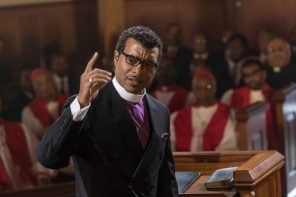A couple of decades back few could rise higher than Carlton Pearson. The fourth generation Pentecostal mister and former protégé of legendary televangelist Oral Roberts led one of the largest congregations in Tulsa, had the highest rated show on Trinity Broadcasting Network, and was considered a king/queen-maker among aspiring televangelists and gospel artists alike. Pearson was indeed a family boss within the sanctified-Soprano culture of evangelical Christian broadcasting. Everyone who aspired to be anyone desired to get near him. His annual AZUSA conference introduced a larger public to then lesser-known evangelists like Joyce Meyer, Myles Monroe and Bishop T.D. Jakes. And having the opportunity to preach or sing from his pulpit almost guaranteed evangelical acclaim and financial gain.
The higher you rise, however, the harder you fall. Though there was something different about Pearson’s ministerial demise. Pearson wasn’t trolling for prostitutes like Jimmy Swaggart. He wasn’t embezzling funds and bedding employees like Jim Bakker. Nor was he caught smoking meth while being lathered down by male prostitutes like Ted Haggard. Rather, while watching a documentary about suffering in Rwanda, Pearson dared to call into question the traditional doctrines of his Pentecostal faith.
Over time Pearson began preaching what he considered the radical and inclusive love of God. Called the “gospel of inclusion,” Pearson professes that God’s love, as revealed on the cross, redeems persons regardless of race, religious belief, ethnicity or sexual orientation. Pearson even declared that there was no hell in the after-life, only that which we create here on earth. He soon found evidence for his assertion, as all hell was about to break loose within his world of Christian broadcasting.
The Oral Roberts family and university where he graduated and sat on the board disavowed him. Charisma publishing house and several Pentecostal organizations denounced him. And fellow evangelists that were once sycophants in his presence distanced themselves from him. (In the case of Bishop T.D. Jakes, the Dallas preacher dubiously acquired Pearson’s mailing list of subscribers and previously held prime-time spot on TBN).
Within a few years, his 5,000 member congregation was down to a faithful few hundred, his church building was in foreclosure, and his future in Tulsa a foregone failed conclusion.
But it appears Carlton Pearson is in the midst of a ministerial comeback. On this week the 6,000 member Christ Universal Temple of Chicago named him interim senior pastor.
Founded by the Rev. Johnnie Colemon over fifty years ago, Christ Universal is one of the largest and most influential New Thought churches in the country. Rooted in the metaphysical healing milieu of late 19th century America, New Thought faith blends Christian teachings with the power of positive thinking, creative personal power and the universality of God that is represented within humanity. Pearson began gravitating toward this philosophy in recent years and had formed relationships with leading New Thought thinkers such as Rev. Colemon and Rev. Michael Beckwith at the Agape International Spiritual Center in Los Angeles.
It is true that some members of Christ Universal have voiced disappointment over Pearson’s selection. The problem seems to be his Pentecostal roots coupled with his lack of New Thought training.
Pearson believes his inclusionist perspective to be consistent with New Thought teachings, however. Both affirm the radical, inclusive love of God and the divine potential within humanity. But, most importantly, if Christ Universal needs a leader with the proven charisma to lead a multimillion dollar religious empire and the stamina to endure criticisms over controversial theology, Carlton Pearson might just be the perfect fit. The conservative Pentecostal preacher turned progressive religious radical has a proven track record.


